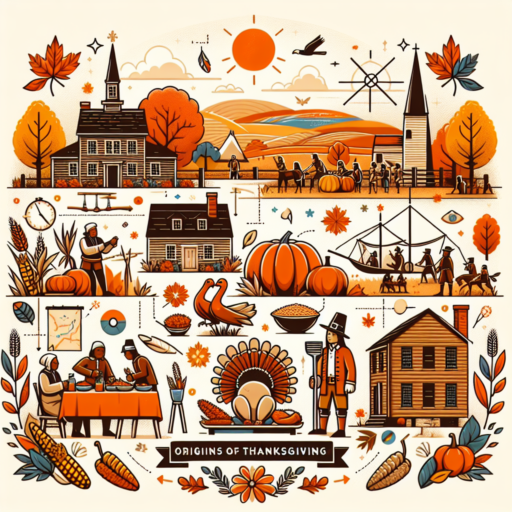Where did Thanksgiving originally come from?
Thanksgiving is widely recognized as an American holiday, celebrated with turkey, stuffing, and gratitude. However, the origins of this festive day can be traced back to both religious and cultural traditions from different parts of the world. Initially, it was a day for people to give thanks for a good harvest and to rejoice together after much hard work.
European Roots
The earliest versions of Thanksgiving can be found in the Old World, long before Europeans settled in North America. In particular, England has a history of celebrating harvest festivals for centuries, with church services and feasting. These celebrations involved giving thanks to God for a bountiful harvest and for the abundance of food. This tradition was brought over by Pilgrims and Puritans from England in the early 17th century.
The First Thanksgiving in America
In America, the event acknowledged as the ‘first Thanksgiving’ was celebrated by the Plymouth colonists and the Wampanoag Native Americans in 1621. This celebration came after the colonists had their first successful harvest in the New World. Despite the harsh conditions they faced upon their arrival, with the help of the Native Americans, they were able to survive and eventually thrive. This three-day feast was a moment of unity, peace, and gratitude between the two groups, filled with foods native to the region and activities that celebrated their successful harvest.
In essence, Thanksgiving has broad and varied roots that extend across continents and cultures. Starting as a way to celebrate the successful cultivation of crops, it has evolved into a holiday that encompasses giving thanks, spending time with family, and, of course, enjoying a bountiful meal.
What is the dark origin of Thanksgiving?
Many people celebrate Thanksgiving with festive joy, unaware of the complex and somber history that shadows its origins. This holiday, established to commemorate a peaceful feast between the Pilgrims and the Wampanoag tribe in 1621, carries a narrative that is often simplified and romanticized. However, the backdrop of this event is marked by a series of interactions that were far from harmonious and were indicative of the tumultuous relations between Native Americans and European settlers.
The initial encounter between the Pilgrims and the Native American tribes was not just about sharing and gratitude but also about forming shaky alliances amid power struggles. The feast that is now symbolized as a moment of unity was actually forged out of necessity and mutual benefit rather than genuine friendship. In the years that followed, these interactions led to a series of conflicts and the eventual displacement and decimation of many Native American tribes. The dark origin of Thanksgiving thus lies in the aftermath of the feast, highlighting a period of colonization marked by violence, disease, and the stripping away of Native American lands and cultures.
Furthermore, the mythologized version of Thanksgiving overshadows the devastating impact European settlement had on indigenous populations. The celebration’s narrative often fails to acknowledge the suffering and loss experienced by Native American communities, not only during the initial colonization period but through centuries of marginalization and broken treaties. Acknowledging the complex history of Thanksgiving necessitates a reflection on the themes of survival, resistance, and resilience demonstrated by Native American societies in the face of adversity.
What is the origin of Thanksgiving in the Bible?
The origin of Thanksgiving in the Bible can be traced back to the Old Testament, where the notion of giving thanks to God is deeply ingrained. This concept is evident in various forms, such as sacrifices, feasts, and specific days dedicated to expressing gratitude to the divine. One notable example is the Feast of Tabernacles (Sukkot), which is considered a time of thanksgiving for the fruits of the earth in the harvest season.
In addition to the Old Testament, the New Testament also emphasizes the importance of thanksgiving in the Christian life. The Apostle Paul, in particular, frequently encourages believers to give thanks in all circumstances. For example, in 1 Thessalonians 5:18, he writes, «give thanks in all circumstances; for this is God’s will for you in Christ Jesus.» This passage highlights that thanksgiving is not only about celebrating bountiful harvests but also about maintaining a grateful heart regardless of life’s circumstances.
Moreover, thanksgiving in the Bible transcends the mere act of giving thanks; it is often accompanied by prayers, songs, and even acts of service. The Psalms, for instance, are filled with verses that express a deep sense of gratitude towards God for His protection, provision, and guidance. Psalm 100:4 says, «Enter His gates with thanksgiving and His courts with praise; give thanks to Him and praise His name.» This illustrates the interconnection between thanksgiving, worship, and relationship with God in biblical teachings.
No se han encontrado productos.
Did Thanksgiving come from Europe?
The question of whether Thanksgiving originated in Europe is one that delves into the depths of historical traditions and cultural exchanges. This festivity, widely associated with the United States, evokes imagery of family gatherings, turkey, and thankfulness, but its roots may be more complex than the commonly told story of the Pilgrims and the Native Americans.
Historical European Festivals
Indeed, several European cultures celebrated harvest festivals long before the advent of Thanksgiving in North America. For instance, the British Isles have a history of marking the end of the harvest season with festivities as far back as pagan times. Similarly, the Spanish and the French held ceremonies of thanks for good harvests and other blessings. These events, rich in tradition and community spirit, share similarities with the Thanksgiving celebrations we know today.
Influence on the American Thanksgiving
When looking at the origins of Thanksgiving in the United States, it’s important to consider the influence of European settlers. The pilgrims, who celebrated the first Thanksgiving in 1621, were themselves Europeans and would have been familiar with the concept of giving thanks for a bountiful harvest. Their festivities, attended by Native American guests, might have drawn on their ancestral traditions, yet were also shaped by the unique circumstances and relationships in their new environment.




